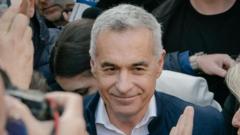Romanian far-right populist Calin Georgescu faces significant setbacks as he is barred from participating in the presidential election rerun, prompting protests and violent clashes with police that underscore deep political tensions in the country.
**Romanian Far-Right Candidate Denied Candidacy Amid Violence and Controversy**

**Romanian Far-Right Candidate Denied Candidacy Amid Violence and Controversy**
Romania’s electoral authority denies far-right hopeful Calin Georgescu a chance to run in presidential election rerun, sparking clashes with police.
The Romanian Central Electoral Bureau (BEC) announced on Sunday that Calin Georgescu, who had previously taken the lead in last year’s presidential elections, would not be allowed to run in the upcoming rerun scheduled for May. The decision follows revelations that Russia had allegedly supported him through a network of 800 TikTok accounts, prompting the nation’s constitutional court to annul the results of November’s first round of voting.
Georgescu's exclusion has instigated protests in the capital city of Bucharest, where supporters clashed with riot police, resulting in at least four arrests. As tensions flared, demonstrators reacted violently, with reports of overturned vehicles and property damage surrounding the BEC offices. Georgescu decried the ruling as a “direct blow” to democracy and called for an official appeal within 24 hours, claiming that the BEC’s decision undermined electoral integrity.
The political backdrop of Georgescu's candidacy is complex; emerging from obscurity, he garnered significant support by promising a shift away from international dependencies, particularly aimed at challenging constraints imposed by NATO and the EU. His previous statements indicated a pro-Russian stance, notably suggesting an end to support for Ukraine if elected.
In the wake of the electoral upheaval, U.S. political figures, including Vice President JD Vance, criticized Romania’s actions regarding Georgescu's candidacy, suggesting that they were influenced by external pressures. The tensions have also drawn comments from figures like Romanian Foreign Minister Emil Hurezeanu, who accused billionaire Elon Musk of interfering in the electoral process based on his supportive tweets about the candidate.
As the situation unfolds, it reflects broader concerns regarding democratic principles and foreign influence in Eastern Europe amid a challenging geopolitical landscape. With Georgescu’s fate now resting with the country's highest court, uncertainties surrounding Romania's political climate persist, highlighting the urgent need for transparent and fair electoral processes in this pivotal moment.






















